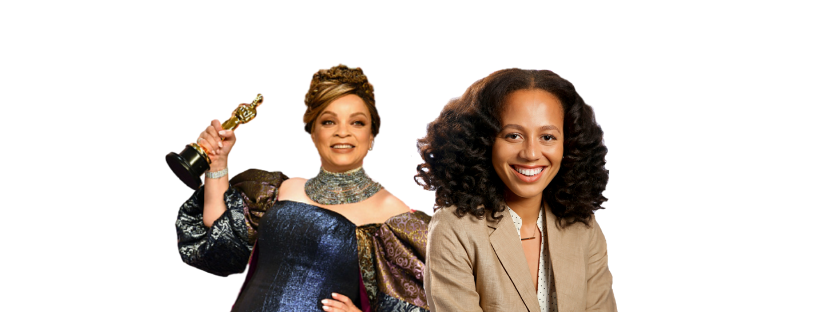The most undeniable force in this world is the Black woman. We are creative, resilient, selfless, and undefined. This Women’s History Month, we are saluting Black women who are disrupting their industries from nuclear engineering to costume design and everything in between.
Below is a list of amazing women whose work continues to challenge how we are seen in the world:
1. Dr. Mareena Robinson Snowden, Industry: Nuclear Engineering

Dr. Robinson Snowden in our For Koils wefted hair
In the world of STEM, Dr. Mareena Robinson Snowden is considered to be a trailblazer. In June of 2018, Snowden made history as the first African American to earn a Ph.D. in nuclear engineering from MIT (YES.The first!). In addition to her work in nuclear security policy at the Carnegie Endowment for International Peace, she has shared that part of her mission is to empower young girls and people of color to participate in STEM.
Snowden also happens to be a long time customer of Heat Free Hair and an inspiring one at that! We had the pleasure of asking Dr. Robinson Snowden about her journey and her role as a Black woman in nuclear engineering:
HFH: When did you realize that you had a passion for physics and nuclear engineering?
M: This question is always so interesting to me because, in many ways, I think there are things that we do without consciously knowing we are doing them. I started enjoying science for the first time in my 12th grade physics class, in large part because of how my teacher at the time made it very systematic and accessible. She focused on teaching us the patterns to problem-solving – how to identify problems of a similar type, and match those problems with the formulas we had to solve them. In many ways, physics is like solving a puzzle – finding the right pieces and fitting them together. And still, even though I was enjoying the class and doing well on the problems, I didn’t identify that experience as “a passion for physics.” To me, I was doing what was expected of me as a student and the fact that I didn’t dread the experience (as I had in so many science classes before that), only registered as icing on the cake rather than a passion. It was not until the summer between my sophomore and junior year at Florida A&M University, as an intern in the MIT Summer Research Program (MSRP), that the full opportunity in STEM was articulated to me. That MSRP experience affirmed that I was able to excel in research, and that affirmation was what really fueled my passion not only for STEM, but to pursue my Ph.D. in a STEM field.

HFH: What challenges did you face as a Black woman in STEM? How did you overcome them?
M: I think there are two main challenges common to underrepresented people in STEM, particularly black women, and those are isolation and the pressure one feels to have to “prove themselves”. Comparing my undergraduate experience at a historically black college to my graduate experience at MIT, there was definitely an initial culture shock because the two environments are so different. The HBCU model is centered on the experience of the black community. This model is based on the assumption that excellence is inherent in black and brown students, and can be fostered and developed through dedicated study, mentorship and community within the HBCU. Leaving FAMU for MIT, that assumption went from something that was affirmed externally to something I had to affirm within myself, each day.
My strategy against isolation was simple – to find a community. I was fortunate that MIT had resources dedicated to underrepresented folks in search of community, whether you were an international student, a student of color, or LGBTQ student. I became involved in the Black Graduate Student Association and other multicultural groups that gave me a new set of friends who could understand where I came from culturally and share in my unique MIT experience. Community also helped in relieving some of the pressure I felt to legitimize myself on campus. The idea of ‘power in numbers’ meant that I didn’t have to downplay my womanhood or blackness in order to ‘fit in’. I had a community that affirmed the parts of my identity that made me unique at MIT, a community from which I pulled a great deal of inspiration, motivation, and guidance. Understanding that a career in STEM is a group sport - not only in the creation of rigorous scientific analysis but also in maintaining a strong and healthy sense of self – was key in my successful experience in the Ph.D. program at MIT.
HFH: What's one piece of advice you would give to Black women aspiring to enter the STEM world?
M: Be compassionate with yourself. Struggle is an inherent part of the process of achieving goals, and if we are not careful in how [we] speak to ourselves, in our own minds, we can become the biggest obstacles to our success. I give this advice humbly because I’ve learned this is a lesson we have to keep reminding ourselves of as the context of our lives and boldness of our goals change. Instead of framing your current circumstance in terms of what you don’t have – the 4.0 GPA, or the long publications list, or the prestigious award – frame where you are based on how far you’ve come. This compassion will allow you to see how much progress you’ve made, and how inherently valuable your goals in STEM are - not just for you but for all the young women looking to you for inspiration.

HFH: We love how you experiment with styles from our For Koils Collection. Why is important for you to wear to your natural texture?
M: I believe every woman should be empowered to wear her hair how she prefers - be it natural, relaxed, with color, or extensions. For me, the decision to go natural was based on the versatility that it offered. Not only could I wear my hair straight if I wanted, but I could also achieve highly textured looks that weren’t possible when my hair was relaxed. Having been natural for almost 10 years, I have developed an appreciation for styling options that offer both protection and convenience. As such, I am a huge fan of wigs and braids and have enjoyed adding the Heat Free Hair line to my list of tried-and-true products.
2. Ruth E. Carter, Industry: Film

Carter in our For Koils Wefted hair
This award-winning costume designer has an impressive career in the world of film. You may recognize her work in films like School Daze, Malcolm X, and Selma. Her unmatched creativity has led to some of the most iconic looks in entertainment history. Carter’s latest contribution on the critically acclaimed film - Black Panther- helped her earn her third Oscar nomination for Best Costume Design.
On February 24, 2019, we witnessed history. On that very night, Carter became the first African American to receive an Academy Award in this category. While accepting the award she shared, “It’s been my life’s honor to create costumes, thank you to the academy. Thank you for honoring African royalty and the empowered way women can look and lead on screen.” She continued, “My career is built with passion to tell stories that allow us to know ourselves better.”

Photo: Frazer Harrison/Getty Images
Carter's work in film has fortified the representation of black women. Her dedication to challenging how we are seen in this world is why we honor her - That's the truth, Ruth!
Learn about more amazing Black women disruptors in part two of our "Women We Salute" series coming soon!














